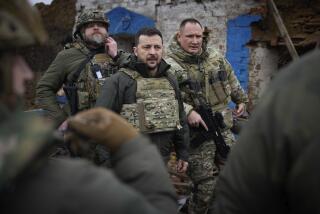Moscow Mayor Threatens to Quit in Dispute With Yeltsin
- Share via
MOSCOW — In a growing rift between President Boris N. Yeltsin and one of his longtime, powerful allies, Moscow Mayor Yuri M. Luzhkov threatened Tuesday to resign unless the city’s fired prosecutor and police chief are reinstated.
Luzhkov, a popular autocrat who runs Moscow the way the late Richard J. Daley ran Chicago, said he is the real target of the purge demanded by Yeltsin in the wake of the March 1 slaying of a television personality.
“This is aimed at the mayor of Moscow,” Luzhkov said in a televised interview. “This is absolutely not to the president’s advantage. He is being let down by those pushing him toward a confrontation with Moscow.”
Tension between the president and the mayor has been building for months, largely on Kremlin suspicions that Luzhkov plans to challenge Yeltsin for the presidency next year. It burst into the open after the gangland-style shooting in Moscow of Vladislav Listyev, a talk-show host who had been named to head and reorganize Russia’s lucrative, state-owned television network.
Amid a national outpouring of grief, Yeltsin accused Luzhkov’s administration of ignoring organized crime and said the city’s police chief, Vladimir Pankratov, and chief prosecutor, Gennady Ponomaryov, should be fired.
Luzhkov objected, calling the two officials respected crime-fighters whose departure would be applauded by mobsters.
But the two men, loyal to the mayor, were fired Monday by their federal superiors, the interior minister and the prosecutor general, who are loyal to Yeltsin. Each was replaced by his top deputy.
Yeltsin’s Security Council endorsed the firings by unanimous vote Monday after withdrawing an invitation to Luzhkov to attend.
The council declared that “the lack of tangible results” in the battle against crime was discrediting the authorities and “threatening the security of Russia.”
A Moscow police spokesman said the department was demoralized by its chief’s removal.
Pankratov, who had been on the force for 39 years, met with his top officers and declared that he “would not go silently.”
Luzhkov claimed that he has constitutional power to block either dismissal. Legal specialists said he is partly right--the police chief cannot be replaced without the mayor’s consent.
The mayor said he will appeal the decisions to Russia’s Constitutional Court. If he loses, he said, “there is nothing for me to do but to decide on my resignation.”
Luzhkov was one of Yeltsin’s few visible supporters when Yeltsin was ousted from the ruling Soviet Politburo in 1987.
Running on Yeltsin’s slate in 1991, Luzhkov was elected deputy mayor and later moved up when the elected mayor quit. He also backed the president against a 1991 coup by Soviet hard-liners and a 1993 revolt by armed backers of the reform-resistant Parliament.
In turn, Yeltsin has rebuffed free-market reformers in his government by giving the mayor the right to conduct his own privatization program, one that keeps control of real estate in the city’s hands and makes Luzhkov one of the most powerful men in Russia.
An early sign of trouble between the two came in December when presidential security guards commanded by Maj. Gen. Alexander Korzhakov surrounded the headquarters of Most Bank, which handles much of the city’s accounts, and beat up the head of its security force in what was later described as a financial investigation.
Although neither Yeltsin nor Luzhkov is a declared candidate for president, Russian commentators suggest that Korzhakov, one of Yeltsin’s most trusted aides, sees the popular mayor as a dangerous rival and is pushing the president to discredit him.
While opinion polls show that Russians consider crime and corruption the biggest problems facing the country, little has come of Yeltsin’s periodic efforts to declare war on criminals.
More to Read
Sign up for Essential California
The most important California stories and recommendations in your inbox every morning.
You may occasionally receive promotional content from the Los Angeles Times.













